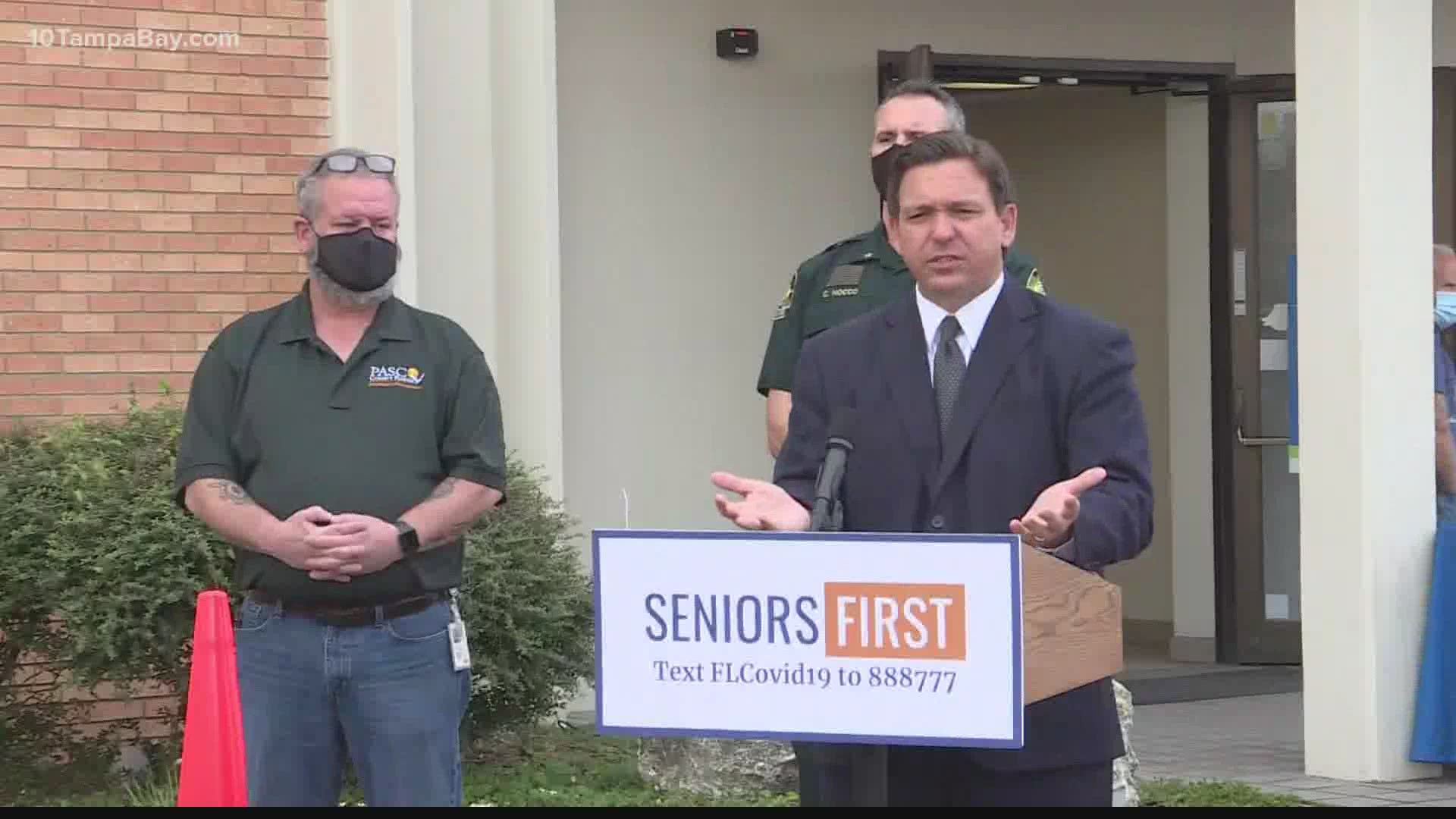TAMPA, Fla. — Florida Gov. Ron DeSantis has been spending the last few weeks traveling the state pushing his "Seniors First" vaccination plan ensuring Floridians age 65 and older have access to a COVID-19 vaccine.
While demand still greatly outweighs supply, the governor has started to open up eligibility, including to teachers and first responders age 50 and older.
His executive order also includes a more vague group known as "those with extreme vulnerability to COVID-19."
Wednesday at a news conference in Zephyrhills, Gov. DeSantis answered questions about how exactly one would know whether they qualify as "extremely vulnerable".
"We think trusting our doctors is the way to go. I think most of the physicians have to sign their name to this, they obviously want this to be something legitimate. I don’t think you’re going to see any funny business with it," said DeSantis.
People who think they might fit the criteria should call their doctor to find out and then have them fill out the form provided by the state. You'll need that form as proof you qualify when you show up to get your shot.
The CDC lists a number conditions that increase someone's risk of severe illness from the virus that causes COVID-19. They include cancer, heart conditions, obesity, and diabetes. However, the ultimate decision is left up to individual doctors in Florida.
10 Tampa Bay took three hypothetical patient scenarios to a few doctors to see whether they would consider them "extremely vulnerable" to COVID-19.
25 YEARS OLD, ASTHMA
Both Dr. Andrew Daley and Dr. Nishant Anand said they would have to know more about how severe the patient's asthma is before signing off.
"Someone who uses an inhaler once a month, that’s probably not severe asthma. Someone who’s been in the hospital several times, three times in a year, that would put them at high risk," said Dr. Anand.
Dr. Marissa Levine agreed it would depend on how severe the patient's asthma is and whether it's controlled.
45 YEARS OLD, OVERWEIGHT/SMOKER
Dr. Daley: I would seriously consider filling out the form for that individual.
Dr. Anand: If you’re just a little overweight, you couldn’t qualify.
Dr. Levine: That would put them in a very high risk category. We know smoking, underlying lung disease more than likely and obesity has risen to the top in terms of a huge risk factor.
55 YEARS OLD, DIABETES/HIGH BLOOD PRESSURE
Age was a big factor for the doctors who ultimately determined they would most likely sign off on this patient.
"We have two chronic diseases we have to consider, as well as a patient’s age," explained Dr. Daley.
Dr. Anand said he would probably still look closely at how severe their diabetes is adding, "You have to apply and look at the individual patient’s unique circumstances to determine if they are vulnerable. It’s not a one size fits all."
Dr. Levine said age alone is a risk factor in this scenario adding, "You’ve added two underlying conditions. Each put this person at a higher risk status."
Will people abuse the system?
The governor isn't concerned about patients and doctors beating the system. DeSantis thinks, by and large, doctors will make legitimate determinations to lead to successful outcomes for their patients.
As Dr. Daley said, "It’s what we’ve trained for. It’s what we swore an oath to do."
- CVS offering COVID vaccine to Florida teachers under 50
- $600K in COVID-19 precautions: Here's what to expect at this year's Florida Strawberry Festival
- House passes sweeping police reform bill named after George Floyd
- Senate debate on COVID bill, $1,400 checks may start today
- SpaceX's Starship sticks its landing but blows up
- Where to get the COVID-19 vaccine in Florida
►Breaking news and weather alerts: Get the free 10 Tampa Bay app
►Stay In the Know! Sign up now for the Brightside Blend Newsletter

